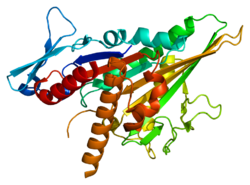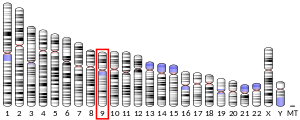Golgin subfamily A member 1 is a protein that in humans is encoded by the GOLGA1 gene .[ 5] [ 6]
The Golgi apparatus, which participates in glycosylation and transport of proteins and lipids in the secretory pathway, consists of a series of stacked cisternae (flattened membrane sacs). Interactions between the Golgi and microtubules are thought to be important for the reorganization of the Golgi after it fragments during mitosis. The golgins are a family of proteins, of which the protein encoded by this gene is a member, that are localized to the Golgi. This encoded protein is associated with Sjogren's syndrome.[ 6]
^ a b c GRCh38: Ensembl release 89: ENSG00000136935 – Ensembl , May 2017^ a b c GRCm38: Ensembl release 89: ENSMUSG00000026754 – Ensembl , May 2017^ "Human PubMed Reference:" . National Center for Biotechnology Information, U.S. National Library of Medicine .^ "Mouse PubMed Reference:" . National Center for Biotechnology Information, U.S. National Library of Medicine .^ Griffith KJ, Chan EK, Lung CC, Hamel JC, Guo X, Miyachi K, Fritzler MJ (September 1997). "Molecular cloning of a novel 97-kd Golgi complex autoantigen associated with Sjögren's syndrome" . Arthritis and Rheumatism . 40 (9): 1693–1702. doi :10.1002/art.1780400920 PMID 9324025 . ^ a b "Entrez Gene: GOLGA1 golgi autoantigen, golgin subfamily a, 1" .^ Lu L, Hong W (September 2003). "Interaction of Arl1-GTP with GRIP domains recruits autoantigens Golgin-97 and Golgin-245/p230 onto the Golgi" . Molecular Biology of the Cell . 14 (9): 3767–3781. doi :10.1091/mbc.E03-01-0864 . PMC 196566 PMID 12972563 .
Barr FA (April 1999). "A novel Rab6-interacting domain defines a family of Golgi-targeted coiled-coil proteins" . Current Biology . 9 (7): 381–384. Bibcode :1999CBio....9..381B . doi :10.1016/S0960-9822(99)80167-5 PMID 10209123 . S2CID 14404566 . Lu L, Hong W (September 2003). "Interaction of Arl1-GTP with GRIP domains recruits autoantigens Golgin-97 and Golgin-245/p230 onto the Golgi" . Molecular Biology of the Cell . 14 (9): 3767–3781. doi :10.1091/mbc.E03-01-0864 . PMC 196566 PMID 12972563 . Lu L, Tai G, Hong W (October 2004). "Autoantigen Golgin-97, an effector of Arl1 GTPase, participates in traffic from the endosome to the trans-golgi network" . Molecular Biology of the Cell . 15 (10): 4426–4443. doi :10.1091/mbc.E03-12-0872 . PMC 519138 PMID 15269279 . Luke MR, Houghton F, Perugini MA, Gleeson PA (June 2005). "The trans-Golgi network GRIP-domain proteins form alpha-helical homodimers" . The Biochemical Journal . 388 (Pt 3): 835–841. doi :10.1042/BJ20041810 . PMC 1183463 PMID 15654769 . Lock JG, Hammond LA, Houghton F, Gleeson PA, Stow JL (December 2005). "E-cadherin transport from the trans-Golgi network in tubulovesicular carriers is selectively regulated by golgin-97" . Traffic . 6 (12): 1142–1156. doi :10.1111/j.1600-0854.2005.00349.x PMID 16262725 . S2CID 32851401 . Alzhanova D, Hruby DE (June 2007). "A host cell membrane protein, golgin-97, is essential for poxvirus morphogenesis" . Virology . 362 (2): 421–427. doi :10.1016/j.virol.2007.01.003 . PMC 2680701 PMID 17276477 .




